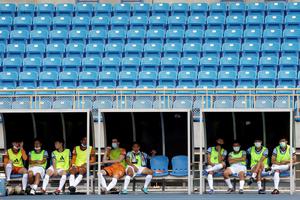Tug of War Over Water Resource Bill

Limitations in terms of financing become the main obstacle. The construction of 10 million clean water pipe connections requires an investment of Rp 150 trillion. Not to mention that most of the regional water company (PDAM) businesses are not healthy. Until last year, there were 391 local water companies. From that amount, 223 companies performed well, 99 companies are not healthy, and 52 companies are ill. Meanwhile, the performance of 17 other companies has not been assessed due to various problems.
The working group of the water resource bill also ensures that the private sector will still be allowed to manage the packaged drinking water industry. The DPR prioritizes people's right to drinking water, but the industry also needs water. Investors will even think twice before investing in Indonesia. “Packaged drinking water is no longer a problem. Private, of course, can manage it. Nothing’s changed,” DPR’s Working Group Head Lazarus said.
Rejection Persists
According to the People's Coalition for the Right to Water (KruHa) Research Head Sigit Budiono, the changes to some articles in the bill provide private sector opportunities to commercialize water. He also criticized the exclusion of packaged drinking water from clean water product types for daily needs without any restrictions.
He said the packaged drinking water entrepreneurs could get a water concession permit without going through a precise control mechanism. It happened even though their water usage volume is enormous, and its profit margin can reach two-fold. “Drinking water must also be regulated immediately. They continue to reject this law, but there are no restrictions on the regulation,” he said.
KruHa also asks the ratification of the bill into law to be postponed. This coalition sees that the substance of the bill has repeated many mistakes as in Law No. 7/2004 on water resources. In 2015, the MK overturned Law No. 7 because it contradicted the constitution.
“We ask that the discussion of this bill be postponed until the next plenary meeting of the DPR,” Walhi Executive Director Nur Hidayati, who represents the coalition, said in a press conference in Jakarta, Sunday (9/1).
According to him, the academic draft of the water resource bill that being discussed by the DPR (term of office from 2014 to 2019) is in favor of allowing the private sector to commercialize water. The discussion of the bill during the current parliamentary transition will sacrifice public involvement. He is also worried that the DPR would not be substantial in drafting this bill.
The 2004 Water Resource Law
In 2015, the MK overturned Water Resource Law No. 7/2004. The cancellation was in response to a lawsuit filed by the Muhammadiyah Central Executive along with some people and prominent figures.
They saw that the law violated the 1945 Constitution, as it frees the private sector to manage water resources for business purposes. Some of its articles opened opportunities for privatization and commercialization of water resource management, which will harm the people as water users.
With the cancellation of this law, the MK revived Irrigation Law No. 11/1974. It aims at preventing a legal vacuum until the creation of new regulation. Therefore, the DPR is currently working on the bill. This water resource law is expected to be ratified next month.
In terms of restrictions on water management, MK has emphasized five crucial points. First, any water exploitation must not interfere with and negate people’s rights. Besides being controlled by the state, water is intended for the maximum prosperity of the people.
Second, the state must fulfill the people’s right to water as a human right based on Article 281, paragraph 4 of the 1945 Constitution. It must be the responsibility of the government. Third, water management must also pay attention to environmental sustainability.
Fourth, as an essential production branch and control the lives of many people, water management must be under absolute supervision and control by the state. It has been regulated in Article 33, paragraph 2 of the 1945 Constitution. Fifth, the absolute right of water management belongs to the country, so the priority given to the concession of water is SOEs or ROEs.
In 2017, the DPR began to initiate discussions on the new water resource bill. The bill discussion was a top priority in the 2018 National Legislation Program (Prolegnas). However, it was a fierce discussion and could not be finalized. The DPR Commission V and the government had approved the bill and are now waiting for approval in the plenary meeting before the working period of the current DPR members ends next month.






